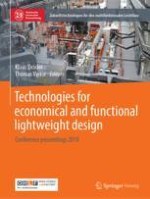2019 | OriginalPaper | Chapter
IMPROVING THE DURABILITY OF BIO HYBRID FIBER REINFORCED PLASTICS BY PLASMA TREATMENT
Authors : Florian Bittner, Martin Bellmann, Madina Shamsuyeva, Hans-Josef Endres, Wolfgang Viöl
Published in: Technologies for economical and functional lightweight design
Publisher: Springer Berlin Heidelberg
Activate our intelligent search to find suitable subject content or patents.
Select sections of text to find matching patents with Artificial Intelligence. powered by
Select sections of text to find additional relevant content using AI-assisted search. powered by
Natural fiber-reinforced polymer composites have already been successfully established in various lightweight applications subjected to moderate mechanical stress, e.g. automotive interior. Recently, the development of biobased hybrid composites containing both, natural and high-performance fibers, gained the attention of research institutions and industry. These new composites offer optimized density, mechanical performance, have reasonable cost and low environmental impact. The bio hybrid composites enable utilization of the advantages of cellulose-based and high-performance fibers in the same composite and minimize the limitations of the individual composites. Although this approach seems to be a promising solution for several drawbacks, the deficiency of the approaches to improve the durability of these composites in outdoor applications limits their market penetration.In this project, a specially developed plasma treatment approach, cascade-atmospheric pressure plasma is being adapted in order to improve the mechanical performance of the biobased (hybrid) composites for the application-oriented use under various environmental conditions, e.g. high humidity absorption and temperature variance. This study presents selected results of this project including the assessment of the plasma treatment of multi-ply textiles and the corresponding influence on the mechanical performance of the composites. UD flax tapes and balanced, more isotropic flax fabrics were treated under various plasma parameters and integrated into a partially biobased epoxy resin via vacuum infusion. The analysis of the textile surface and composite mechanical properties were used for the assessment. It has become evident that the selection of the plasma parameters has a significant effect on the packing density and wettability of the treated textiles. Controversial effects have been observed with regard to the mechanical properties of the composites. An improvement of weathering durability is still remaining.
